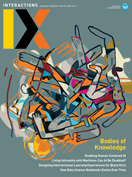Authors:
Michael D. Ekstrand, Maria Soledad Pera, Katherine Landau Wright
Internet users encounter numerous Al-powered systems throughout their daily life. One class of systems they frequently use directly and explicitly are information access systems: search engines, recommender systems, and other systems that facilitate users locating and accessing relevant information, products, and so on from large digital inventories. There is a rich literature on both the human and technical aspects of designing, deploying, and evaluating such systems to meet users' information needs in information retrieval, human-computer interaction, information science, and other disciplines. Most of these information access systems are increasingly using sophisticated AI techniques across their architecture to interpret users'…
You must be a member of SIGCHI, a subscriber to ACM's Digital Library, or an interactions subscriber to read the full text of this article.
GET ACCESS
Join ACM SIGCHIIn addition to all of the professional benefits of being a SIGCHI member, members get full access to interactions online content and receive the print version of the magazine bimonthly.
Subscribe to the ACM Digital Library
Get access to all interactions content online and the entire archive of ACM publications dating back to 1954. (Please check with your institution to see if it already has a subscription.)
Subscribe to interactions
Get full access to interactions online content and receive the print version of the magazine bimonthly.






